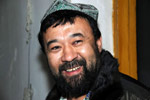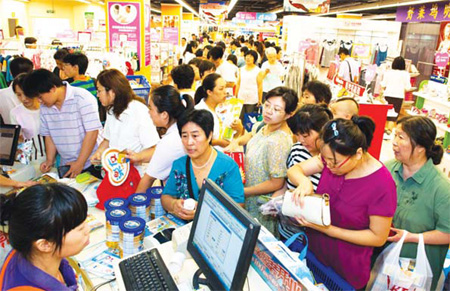Economy
Baby boom bonanza
Updated: 2011-02-18 13:26
By Zhang Ran (China Daily European Weekly)
|
Customers swarm the Leyou store during a sales promotion. China's baby products market is estimated to grow by about 17 percent annually. |
According to the National Bureau of Statistics, nearly 30 percent of the total expenditure of urban families is on infants or children.
With most of the Chinese families adopting a "4+2+1" pattern, the annual spend on a child by the extended family has also increased considerably.
That in turn, has helped push revenues for baby and child care product manufacturers.
According to a report from Boston Consulting Group, the market value of China's baby industry alone - including food, garments, toys and related products - was around 130 billion yuan (14.6 billion euros) in 2009 with an annual growth rate of 17 percent till 2012.
By 2005, the revenue of Leyou Dakang Technology Inc, the company set up by Hu and her husband Gong Dingyu, a former Cisco and Microsoft China executive, surpassed the 100 million yuan mark.
Leyou is now one of China's largest specialty retailers, which sells more than 10,000 different products, including maternity dresses, diapers, milk powder, nursing bottles, toys and clothes. The company sells seven categories of products from 530 suppliers in 23 countries.
Altogether, Leyou owns about 140 stores spread across seven cities in northern China including Beijing, Tianjin, Shenyang and Xi'an. The company plans to have *** stores in *** cities by the end of the year, says Hu.
For Leyou, the decision to shift its marketing focus from online to offline sales has proved to be lucky as the dotcom debacle of 2001 led to the closure of many e-commerce companies. In March 2001, Leyou took the first offline step by opening a store at Jiaodaokou in Beijing.
Until then there were no specialty baby product chain stores in China and most of the products were sold in supermarkets and department stores.
"The specialty chain store concept is more competitive especially in terms of price. Due to the centralized purchasing and the presence of an online platform, prices at Leyou stores are 10-15 percent lower than other channels," says Hu.
The specialty stores also offer better services. "For instance, if a mother comes to buy baby food, our shop assistants will recommend an appropriate product according to the age of the baby," Hu says.
According to Hu, when the average annual income of a family exceeds $7,000 (5,182 euros), specialty chain stores for certain commodities or services will have their market and competitiveness.
To access more remote areas, Leyou launched a service in 2004 to integrate its network, catalogue and stores. Hu Chao says the three channels can complement each other and reach a wider audience. While the website and catalogue can attract more customers, the stores act as a platform to promote new brands and new products.
Currently Leyou's stores contribute about 70 percent of sales, with the remaining 30 percent coming from the website and catalogue. Leyou's current gross margin stands at around 20 percent, partly because new brands are bringing in higher profits through the three channels.
"Despite the immense potential, there is also pressure due to intense competition," she says.
Attractive market
Many companies, including several original baby product manufacturers, are taking aim at the profitable retailing market.
The Jiangsu-based baby stroller maker Goodbaby, is now the largest supplier of strollers in North America, Europe and China. After more than 20 years of global business, Goodbaby has a 40 percent share of the baby carriage market in the United States and an 80 percent share in China.
Enthused by the current baby boom, the company has been increasing its brand building efforts in China. The company entered the retailing business in 2006 with a shop in Xizang Zhonglu, Shanghai. At present, it has 16 mother and baby product stores in China.
The Taiwan-based Les Enphants, which makes and sells children's clothes, sportswear and accessories under the Les Enphants and Petit Chou brands, entered the mainland market in 1993. It is also an authorized sales distributor for mid- and high-end brands like Disney Baby, OshKosh B'gosh and Nike Junior. But the real star for the company is the Les Enphants brand, which occupies the top slot in the retail market for children's apparel.
The company's mainland business now accounted for over 64 percent of the total revenues in 2009, and rose to 65 percent last year. It now owns around 1,500 stores in China and plans to add another 300 more outlets this year.
Enthused by the surging demand, most of the companies are now planning public floats on bourses.
On Nov 24, 2010, Goodbaby International Holdings Ltd, a subsidiary of Goodbaby Group, got listed on the Hong Kong stock exchange. Share prices of the company surged 18.36 percent on the first trading day, underscoring the strong demand for its products. The company is expecting a double-digit order growth during the first quarter.
Leyou also has a listing agenda. Hu says the company will list its shares on the New York Stock Exchange or the Nasdaq over the next 12 to 18 months. The share listing will help the company raise funds for future expansion.
In July 2007, seven years after its first investment, Leyou got a cash injection of $11 million from AsiaVest Partners. Later, it received a third round of investment totaling $37 million from AsiaVest Partners and Deutsche Bank, making it the largest investment recipient in China's baby product industry.
Specials

Spring Festival
The Spring Festival is the most important traditional festival for family reunions.

Top 10
A summary of the major events both inside and outside China.

A role model
Alimjan Halik had been selected as the "Cyberspace Personality Who Moved the Hearts of the Chinese in 2010".
